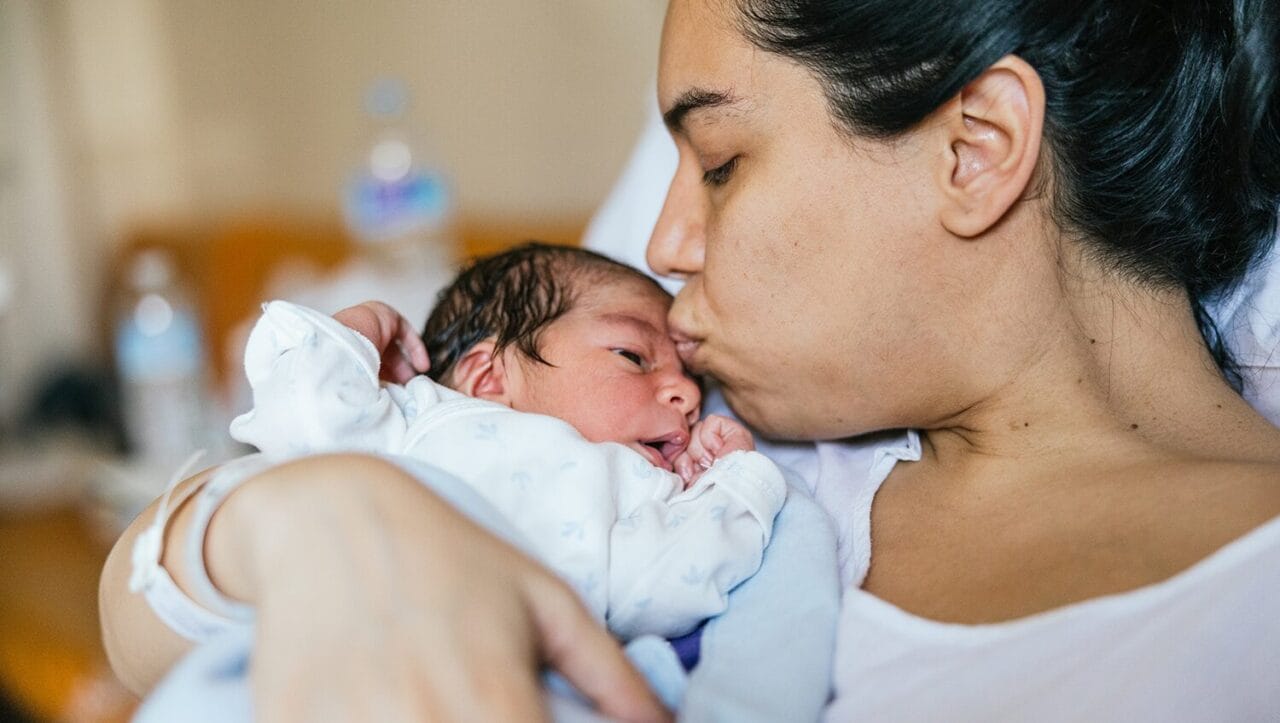
Getty Images
BMC care providers were asked to rewrite national guidelines for new parents living with substance use disorders to help reduce stigma while keeping infants safe.
There’s a lack of consensus among medical professionals as to when breastfeeding should be recommended for individuals with substance use disorder (SUD) after they deliver their baby. Pervasive stigma for people with SUD — particularly pregnant people with SUD — and a lack of training and resources for clinical staff means many teams enforce strict guidelines for these birthing parents, often recommending that they don’t breastfeed at all, despite the evidence-based advantages for their infants, when safe.
Across the country, many hospitals followed the Academy of Breastfeeding Medicine’s (ABM) guidelines, published in 2015. These guidelines offered recommended time periods for parents to have stopped non-prescribed substance use before delivery, but they were very restrictive and based on limited clinical evidence, according to Boston Medical Center experts. If the pregnant patient used any non-prescribed substances during their third trimester, they were recommended against breastfeeding, even if the substance use happened several weeks to months before delivery, when the substance was long out of their system and not a threat to the baby.
A group of experts at Boston Medical Center proved to be the catalyst for enacting change. Through interactions with their patients, BMC providers learned that the existing systems demonstrated that a one-size-fits-all attitude can stigmatize and doesn’t provide the necessary support or autonomy all new parents require and deserve.
“People are always looking to make their hospital policies consistent with whatever the general consensus recommendations are from major organizations,” explains Elisha Wachman, MD, a neonatologist and Vice Chair for Research in the Department of Pediatrics at BMC.
Believing the existing policies misrepresented the actual scientific risk to the infant and the birthing parents, a team of addiction specialists, neonatologists, and OBGYNs at BMC requested the ABM revise its guidelines. In doing so, BMC experts in collaboration with Massachusetts General Hospital (MGH) providers were given the opportunity to rewrite the guidelines themselves, transforming the way medical staff support breastfeeding parents with SUD and their infants, in an evidence-based manner.
HealthCity spoke with Dr. Wachman; BMC primary care addiction specialist Miriam T. Harris, MD, MSc; and BMC OBGYN Kelley Saia, MD to discuss their path toward building guidelines based on scientific evidence.
HealthCity: What kind of restrictions did the Academy of Breastfeeding Medicine’s 2015 breastfeeding protocols place upon new parents with substance use disorder and their infants?
Miriam T. Harris, MD, MSc: The most challenging aspect of the 2015 guidelines was that they were very paternalistic, prescriptive approaches around substance use in the third trimester, and this limited breastfeeding discussions at delivery, which also impact their infants. A lot of the guidelines were not rooted in science.
Elisha Wachman, MD: If somebody had a return to non-prescribed use at any point, they would not be considered eligible to provide breast milk at delivery, even if it was, for example, two months before delivery and there clearly was no non-prescribed substances in their milk.
Obstetrics and gynecology, parenthood, and pediatrics in general, is appropriately a very risk-averse space. But that instinct can be weaponized when it’s combined with stigma or racism
Miriam Harris, MD, MSc
This was in combination with strict guidelines about the amount of prenatal care you had to have received, which for our population at BMC is not something that we would expect from any other pregnant patient. There are many reasons why any patient may not have the recommended number of prenatal care visits, and we don’t restrict breastfeeding for those patients.
HC: How did you come to the conclusion that breastfeeding protocols needed to be updated for a more clinical and scientific understanding of SUD and pregnancy?
Kelly Saia, MD: When you look at people in recovery or birthing people who use substances, bias often comes before medical evidence. Our attempts are to really focus on the facts. What is the best thing for the mom and the baby?’ We know that breast milk for vulnerable infants is important — if it’s possible for the parent to provide breast milk — so it’s an incredibly complex and loaded situation.
When we’re having a conversation with our patients about the health of their baby, that’s what we need to focus on. If they had a return to use three months ago, does that make you less of a parent or less of someone who can provide breast milk? Science says no. And so we need to be pushing that forward, and these updated guidelines get us a lot closer to that.
MH: Obstetrics and gynecology, parenthood, and pediatrics in general, is appropriately a very risk-averse space. But that instinct can be weaponized when it’s combined with stigma or racism, and there are a lot of unintentional harms.
HC: Moving forward, how can we continue to enable patients to make healthy decisions?
MH: I really hope that these guidelines also are a call to the NIH [National Institutes of Health] to provide funding for this incredibly important time in a parent’s and infant’s life. We need so much more research to support updates to these guidelines. As a new parent myself, there’s rarely any decision you’re making that’s 100% risk-free. There’s lots that we don’t know, but what we do know can be given to a breastfeeding person, which will empower them to work with their care team to engage decision-making in a meaningful way.
*This interview has been edited and condensed for clarity and length.


